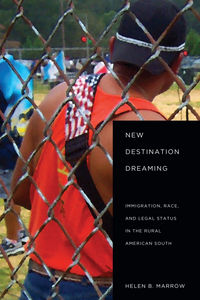New Destination Dreaming:
Immigration, Race, and Legal Status in the
Rural American South
Helen B. Marrow
Stanford University Press (2011)
Now available from Stanford University Press
(and for instructors requesting an exam copy, use code “S11SOC” and get 20% off)
Also available from Amazon.com
New York, Chicago, and Los Angeles have long been shaped by immigration. These gateway cities have also been the major flashpoints in American debates over immigration policy. Since the 1980s, however, new immigrants have increasingly settled in rural and suburban areas, particularly within the South. Couple this demographic change with the increase in the number of unauthorized immigrants, and the rural South, once perhaps the most culturally and racially “settled” part of the country, now offers a window into the changing dynamics of immigration and, more generally, the changing face of America.
New Destination Dreaming explores how the rural context impacts the immigrant experience, how rapid Hispanic immigration influences southern race relations, and how institutions like schools and law enforcement agencies deal with unauthorized residents. Though the South is assumed an economically depressed region, low-wage food processing jobs are offering Hispanic newcomers the opportunity to carve out a living and join the rural working class, though this is not without problems. Inattention from politicians and black-brown tensions are both salient in contemporary rural southern life, and they require serious attention—from whites, blacks, and newcomers alike—if intergroup relations and community trust are to be improved.
Ultimately, Marrow presents a cautiously optimistic view of Hispanic newcomers’ opportunities for upward mobility in the rural South, while underscoring the threat of anti-immigrant sentiment and restrictive policymaking that has gripped the region in recent years. Lack of citizenship and legal status still threatens many Hispanic newcomers’ opportunities. This book uncovers what more we can do to ensure that America’s newest residents become productive and integrated members of rural southern society rather than a newly excluded underclass.
Reviews:
“New Destination Dreaming is an important study. Marrow’s brilliant analysis of the incorporation of Hispanic immigrants into the rural and small-town South is replete with original insights. Guided by a sophisticated theoretical framework, Marrow uses an imaginative research design (based on ethnographic field work, semi-structured interviews, and participant observation) to ask questions that have not been raised before. In the process she collects rich comparative data that are rigorously and creatively examined. This book is a must-read, especially for students of immigration, and race and ethnic relations.”
—William Julius Wilson, Harvard University
“Immigration has come to small town America, and in New Destination Dreaming Helen Marrow offers a penetrating look at how Latino immigrants are faring in two rural southern counties. Drawing on rich observations and detailed interviews, she chronicles the efforts of hard-working migrants of humble origins and tenuous legal status to survive and even prosper in a foreign land while negotiating the complex and often conflicting currents of race, class, and citizenship. The book focuses a clarifying lens on the challenges of assimilation in places that have little experience of diversity beyond the black-white color line and no real history of immigration. It shines new light on old issues and will be of interest to all serious students of immigration.”
—Douglas S. Massey, Princeton University
“With New Destination Dreaming, Helen B. Marrow has established herself as one of the most insightful and original scholars on the dispersion of the immigrant Latino population. By taking economic context, class configurations, and race relations seriously, Marrow shows how newcomers encounter both promise and peril in the Deep South.”
—Rubén Hernández-León, University of California, Los Angeles

